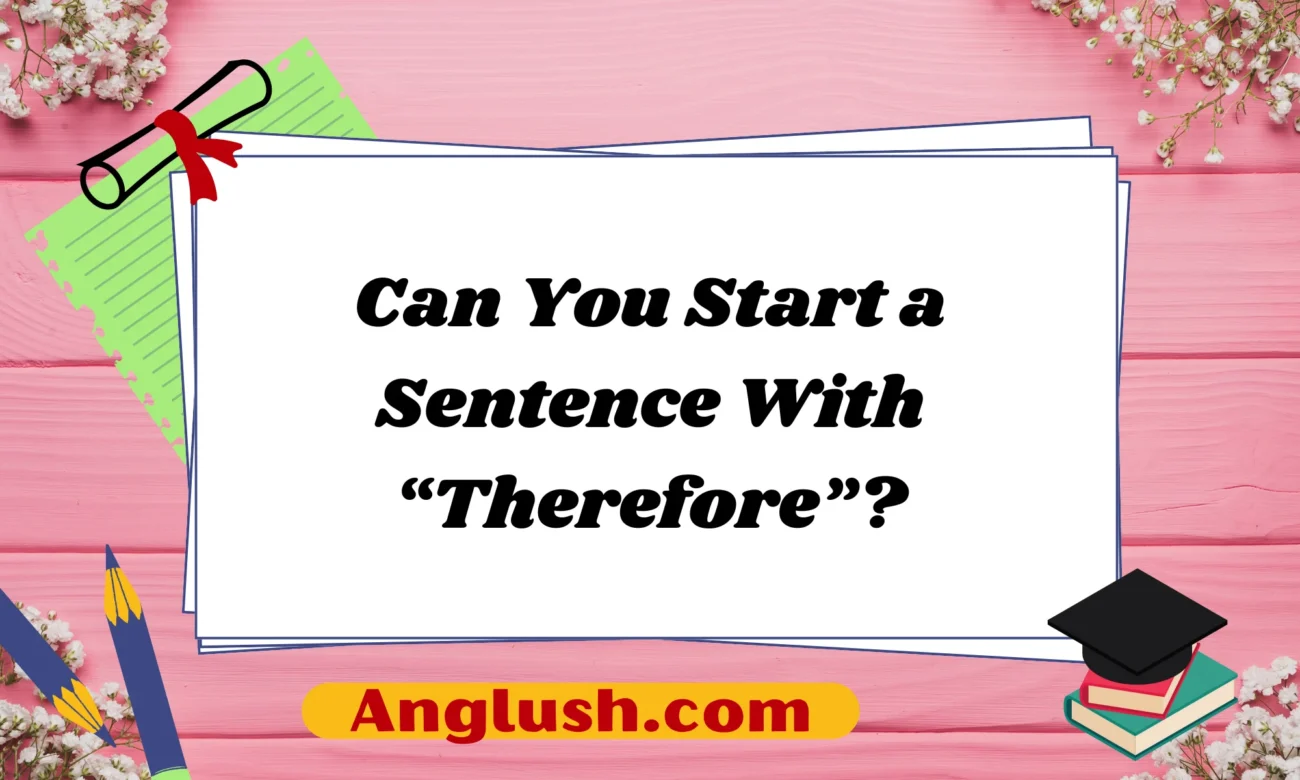Introduction
The English language is filled with rules, exceptions, and stylistic choices that often leave writers wondering whether they are using words correctly. One common question is whether it is appropriate to start a sentence with “therefore.”
The short answer is yes—you can start a sentence with “therefore.” However, using it effectively depends on the context, tone, and formality of your writing. In this article, we will explore when and how to use “therefore” at the beginning of a sentence, alternative words and phrases that can be used in its place, and best practices for professional, academic, and casual writing.
By the end of this guide, you’ll have a clear understanding of how to use “therefore” appropriately and how to choose the best alternatives based on your writing needs.
What Does “Therefore” Mean?
“Therefore” is an adverb that signifies a conclusion or result. It is commonly used to show a logical connection between two ideas.
Examples:
✅ The company’s revenue increased significantly this quarter. Therefore, they decided to hire more employees.
✅ She had studied diligently for months. Therefore, she felt confident going into the exam.
In both cases, “therefore” links the first sentence (the cause or premise) to the second sentence (the result or consequence).
Can You Start a Sentence With “Therefore”?
Yes! It is grammatically correct to start a sentence with “therefore.” However, you must punctuate and structure it properly.
Correct Usage:
- Using “Therefore” with a Comma
She didn’t have enough experience. Therefore, she wasn’t considered for the managerial position. - Using “Therefore” with a Semicolon
He had already eaten; therefore, he wasn’t hungry.
The placement of punctuation ensures clarity and readability.
When to Use “Therefore” at the Beginning of a Sentence
Although you can start a sentence with “therefore,” it is most appropriate in formal or academic writing. Here are some cases where it works well:
1. Academic Writing
The experiment showed consistent results. Therefore, the hypothesis was confirmed.
2. Professional Writing
Our research indicates strong customer interest. Therefore, we recommend launching the product next quarter.
3. Legal and Business Documents
The contract was not signed. Therefore, the agreement is not legally binding.
Using “therefore” at the beginning of a sentence helps create a formal tone and emphasizes logical conclusions.
When to Avoid Starting a Sentence With “Therefore”
While “therefore” is grammatically correct at the start of a sentence, it can sometimes sound too formal or rigid. In casual writing or conversational speech, it might be better to use an alternative.
Example of Overly Formal Usage in Casual Writing:
🚫 She was running late. Therefore, she took a taxi.
✔️ She was running late, so she took a taxi.
In informal situations, simpler alternatives often sound more natural.
Alternatives to “Therefore”
If you want to vary your language or adjust the formality of your writing, here are some alternatives:
| Alternative | Formality | Example Sentence |
| Thus | Formal | He miscalculated the expenses. Thus, the project exceeded the budget. |
| As a result | Neutral | She missed several deadlines. As a result, she received a warning. |
| Consequently | Formal | The team did not meet the goal. Consequently, they revised their strategy. |
| For this reason | Neutral | The software had too many bugs. For this reason, it was delayed. |
| So | Informal | It was raining. So, we stayed inside. |
Choosing the right alternative depends on the tone and context of your writing.
10 Examples of “Therefore” in Different Contexts
Here are ten examples showing how to use “therefore” effectively:
Professional and Business Writing
- Sales increased significantly this quarter. Therefore, we will expand our marketing efforts.
- The survey revealed strong customer demand. Therefore, we are launching the new product earlier than planned.
Academic Writing
- The study confirmed the hypothesis. Therefore, the researchers concluded that the treatment was effective.
- The data was inconsistent. Therefore, further research is needed.
Legal and Formal Documents
- The agreement was not signed. Therefore, the terms are not legally binding.
- The court ruled in favor of the defendant. Therefore, the charges were dismissed.
Everyday and Casual Writing
- It was too late to catch the bus. Therefore, we decided to walk home.
- She didn’t study for the test. Therefore, she didn’t do well.
Technical and Scientific Writing
- The system failed to operate correctly. Therefore, engineers conducted additional tests.
- The medication was ineffective. Therefore, doctors recommended an alternative treatment.
These examples show how “therefore” fits naturally into different styles of writing.
Best Practices for Using “Therefore”
To ensure clarity and effectiveness, keep these best practices in mind:
✅ Use it for logical conclusions – “Therefore” should always indicate a clear cause-and-effect relationship.
✅ Punctuate correctly – Use a comma or semicolon appropriately to ensure readability.
✅ Match the tone to the context – In casual writing, consider alternatives like “so” or “as a result.”
✅ Avoid redundancy – Don’t use “therefore” if another word in the sentence already conveys the same meaning.
Final Thoughts
Yes, you can start a sentence with “therefore,” and it is perfectly acceptable in formal, academic, and professional writing. However, using it correctly involves proper punctuation, a clear cause-and-effect relationship, and an awareness of tone.
If “therefore” feels too formal, there are many alternatives, such as “thus,” “as a result,” or “so,” that can better match the tone of your writing.
By understanding when and how to use “therefore” effectively, you can enhance the clarity and professionalism of your writing while ensuring a smooth and logical flow of ideas.
Meta Description:
Can you start a sentence with “therefore”? Learn when and how to use “therefore” correctly, explore alternatives, and discover best practices for formal, academic, and casual writing.

